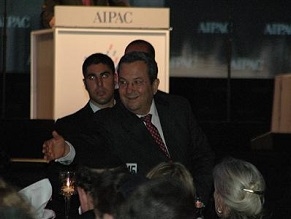|
World Jewish News

Israeli Defense Minister Ehud Barak at the AIAC annual conference in Washington.
|
Barak to AIPAC conference: ‘we need a daring peace initiative vis-à-vis the Palestinians’
05.03.2013, Israel and the World Former Israeli Defence Secretary Ehud Barak opened the first day of the 2013 American Israel Public Affairs Committee (AIPAC) annual conference Sunday by paying tribute to the “immeasurable contribution” of US President Barack Obama and his outgoing American counterpart Leon Panetta to “the strength of Israel, and the maintenance of the truly special relationship between our peoples”.
Heralding American support ahead for securing Israel as “the strong island of stability it is”, ahead of Obama’s arrival in the Jewish State on March 20 for his first visit since assuming office, alongside newly-confirmed Secretary of State John Kerry, Barak stressed that Israel depended on close allies the US as its “one crucial constant”.
Rejecting the commonly-held belief that the root cause of Middle Eastern instability is the Israeli-Palestinian conflict, he insisted the popular uprisings of 2011 across the Arab world and their associated problems would have arisen even if both sides had long ago signed an accord, as he insisted the “most imminent and acute danger to the stability of the entire region” lay not in this conflict, but in the prospect of a nuclear Iran.
However, he conceded “we need a daring peace initiative vis-a-vis the Palestinians”, as he emphasised that a two state solution was the only viable way of securing “our identity and our future as a Jewish and democratic state”, aside from the commonly positioned argument about Palestinian statehood.
Insisting the Palestinians “bear most of the responsibility for past failures” in peace talks with the Israelis, he paid tribute to Israeli Premier Benjamin Netanyahu - who for the first time in seven years will not appear in person before the AIPAC conference, instead making an address via satellite link as he attempts to secure a vital coalition government – for having “taken courageous steps, to renew the process including an unprecedented settlement freeze”, amidst ongoing criticism from the international community of Israel’s settlement building policy constituting an obstacle to peace efforts.
Hailing Israel’s myriad achievements across science, technology, education and cultural sectors, he said he was optimistic for its future as he prepares to bow out of frontline politics, closing his address by quoting late US Democrat President John F Kennedy’s speech during the Cuban Missile Crisis, when he told the nation: “The path we have chosen for the present is full of hazards, as all paths are. But it is the one most consistent with our character and courage as a nation…” Israel, he concluded shared that “character and courage as a nation to make those tough decisions for the future, peace and security of the State of Israel”.
Also addressing delegates on the opening day of the conference was Israeli envoy to the US Michael Oren, who echoed Barak in hailing Netanyahu’s calculated “risks for peace” in the pursuit of “two states for two nations”, as he called for the Palestinians to meet him halfway. Previewing the increasing prospect of itnra-Palestinian reconciliation, as Palestinian President Mahmoud Abbas continues to play with the idea of including Hamas in the next Palestinian administration as Egyptian-brokered talks between the estranged rival factions continue, he said such a move would be a “game ender” for the peace process, which both the US and the EU have championed as a key focal point for 2013.
On Iran, he took a firm stance, following Netanyahu’s insistence earlier Sunday that last week’s talks between Western negotiators and Iran on its contested nuclear programme had only succeeded in buying the regime time to proceed with its intended course of action, Oren insisted that the international community’s preference for “diplomacy hasn’t worked and sanctions haven’t stopped the Iranian nuclear programme”.
Due to speak on the second day of proceedings were US Vice President Joe Biden in place of the absent Obama, as well as Netanyahu by live satellite link, following previous rumours he would not be making any form of address. The Israeli PM’s speech was similarly expected to focus heavily on the Iranian threat and prospects for Middle East peace, which both US and Israeli administrations have confirmed will be key focus for discussions during the course of Obama’s visit to the Jewish State.
EJP
|
|
